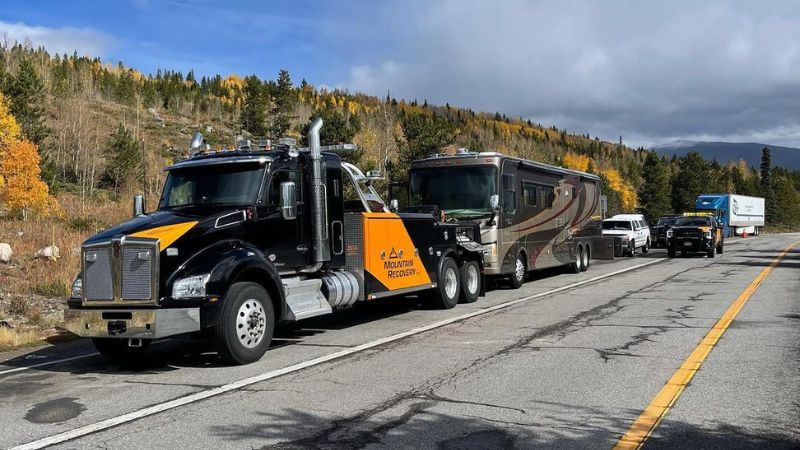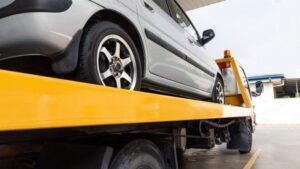Heavy-duty towing is a specialized service designed for transporting large, heavy vehicles such as semi-trucks, buses, and construction equipment. Whether you’re a fleet owner, a truck driver, or someone managing large machinery, understanding the basics of heavy-duty towing can help you avoid costly mistakes and ensure the safe transport of your vehicles. From the types of equipment used to the specific weight capacities, there are important factors that set heavy-duty towing apart from standard towing services. In this blog, we will cover the 10 essential things you should know about heavy-duty towing, including the importance of experienced operators, the kinds of trucks used, and how to choose the right towing company. By the end, you’ll have a clearer understanding of what makes heavy-duty towing a vital service in various industries.
10 Things You Should Know About Heavy-Duty Towing
1. What is Heavy-Duty Towing?
Heavy-duty towing involves the transport of large and oversized vehicles that weigh significantly more than typical cars or light trucks. Vehicles like commercial trucks, RVs, buses, and construction equipment require specialized towing services. The primary difference between heavy-duty and standard towing is the equipment used and the expertise required. Heavy-duty tow trucks are designed to handle massive weight capacities, sometimes exceeding 25 tons. These trucks are equipped with extra-powerful winches, larger frames, and more advanced hydraulic systems to safely tow and transport these large loads. Without the right equipment and experience, towing such massive vehicles can lead to accidents or damage.
Also Read:- Tips For Handling a Motorcycle Breakdown
2. Types of Heavy-Duty Tow Trucks
There are several types of heavy-duty tow trucks, each designed for specific towing needs. The most common are the flatbed tow trucks, hook-and-chain trucks, and wheel-lift tow trucks. Flatbeds are ideal for large equipment that can’t be towed on wheels, like construction machinery. Hook-and-chain tow trucks are older models that are now mostly used for wrecked or damaged vehicles. Wheel-lift tow trucks are more modern and typically used for towing buses and heavy-duty vehicles that need to be lifted by their tires. Each type of tow truck is designed with specific capabilities to manage the weight and size of the vehicle being towed. Understanding the type of tow truck needed for a particular situation can prevent further damage to the vehicle.
3. Heavy-Duty Towing Equipment
Aside from the tow truck itself, heavy-duty towing requires specialized equipment to ensure safe and efficient transport. This includes heavy-duty chains, winches, and spreader bars. Winches are critical for pulling large vehicles out of ditches or other difficult situations. Heavy-duty chains and spreader bars help distribute the weight of the vehicle evenly, reducing the risk of damage during transport. Additionally, specialized lighting and braking systems are used to ensure road safety while towing large vehicles. Towing companies invest heavily in these tools to ensure they can safely handle the largest loads, preventing breakdowns or accidents during the tow.
4. Weight Capacity and Limits
The weight capacity of heavy-duty tow trucks is a crucial factor to consider when towing large vehicles. Heavy-duty tow trucks are typically capable of handling up to 25 to 50 tons. This means they can easily tow large commercial trucks, buses, and even construction equipment like excavators. However, it’s essential to know the specific weight of the vehicle before calling a towing service. If the tow truck isn’t rated for the vehicle’s weight, it can cause safety issues, including equipment failure or damage to the vehicle. Always choose a towing company that has the right trucks for the job to ensure a safe tow.
5. The Importance of Trained Operators
Handling heavy-duty towing equipment requires extensive training and experience. Towing a 40-ton vehicle is vastly different from towing a standard car. A poorly trained operator may not only damage the vehicle but also endanger themselves and others on the road. Operators must be trained in the proper use of the towing equipment, including knowing how to distribute the weight of the load and how to secure it properly. Additionally, they need to be familiar with the local and state regulations regarding the towing of oversized vehicles. Ensuring your towing company has certified operators will give you peace of mind that your vehicle is in good hands.
6. Road Safety Considerations
Towing large vehicles introduces unique challenges on the road. Due to their size and weight, heavy-duty tow trucks have longer stopping distances and reduced maneuverability. This means that operators must exercise extreme caution, especially on busy roads or in poor weather conditions. Towing companies also need to ensure their tow trucks are equipped with specialized lighting, reflective markers, and other road safety equipment to alert other drivers. In many cases, towing a large vehicle may require a special permit, and operators should be well-versed in these legal requirements to avoid fines or penalties.
7. Common Heavy-Duty Towing Scenarios
Heavy-duty towing is required in various situations, such as recovering broken-down trucks, moving construction equipment, or towing buses that have been involved in accidents. Another common scenario is towing vehicles that have been illegally parked or are obstructing traffic. Heavy-duty tow trucks are also used for long-distance towing of large vehicles, especially when a fleet needs to be moved to a different location. Understanding these scenarios helps businesses and individuals plan for potential towing needs and ensure they are prepared in case of an emergency.
8. Heavy-Duty Towing Costs
The cost of heavy-duty towing services can vary greatly depending on the distance, type of vehicle, and complexity of the tow. On average, you can expect to pay more than for standard towing services because of the specialized equipment and skill required. Costs can also increase if special permits are needed, or if the vehicle is in a difficult location requiring additional equipment like cranes or flatbeds. It’s always a good idea to get a detailed estimate from the towing company before agreeing to services to avoid unexpected charges.
9. Choosing the Right Towing Company
Not all towing companies are equipped to handle heavy-duty towing, so it’s important to choose one with a proven track record in this area. Look for companies with experienced operators, proper licensing, and the necessary equipment to safely tow large vehicles. Customer reviews and industry certifications can also provide insight into the company’s reliability. Additionally, a good heavy-duty towing company should offer 24/7 emergency services, as breakdowns can happen at any time, and delays can lead to further complications or financial losses.
Also Read:- Differences Between Flatbed and Wheel-Lift Towing Methods
10. Preparing for a Heavy-Duty Tow
Proper preparation can make a heavy-duty towing situation go much smoother. Start by providing the towing company with accurate information about your vehicle, including its make, model, and weight. Make sure the vehicle is in a safe location for the tow truck to access. If your vehicle has sustained damage, notify the towing company ahead of time so they can bring the right equipment. In some cases, it may be necessary to remove cargo or other heavy items from the vehicle to ensure a safe tow. Proper preparation can save time and prevent additional costs or complications during the towing process.
Conclusion
To ensure the safe transportation of large vehicles and machinery, heavy-duty towing calls for specific knowledge, tools, and experience. Knowing the essential facts can help you make informed decisions when choosing a towing service. Whether you need a tow for a broken-down semi or oversized equipment, selecting the right company with trained operators is crucial. Always prioritize experience, safety, and the proper equipment to get your vehicles where they need to go without added risks.
FAQs
What is considered heavy-duty towing?
Heavy-duty towing refers to the transportation of large, heavy vehicles like buses, trucks, and heavy machinery that exceed standard towing limits.
How do I choose the right heavy-duty towing company?
Look for companies with experienced operators, specialized equipment, and a strong reputation for handling large vehicles safely and efficiently.



